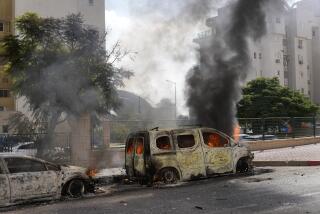Mosque Security Had Worried Rabin Last Fall : Israel: Testimony reveals that prime minister asked for preventive measures in October at the Hebron site where a settler slaughtered Palestinians.
- Share via
JERUSALEM — Prime Minister Yitzhak Rabin was aware as early as last October of the likelihood of escalating extremist acts at Hebron’s Cave of the Patriarchs, the holy site where an armed Jewish settler massacred about 30 Palestinians last month, a senior Israeli commander testified Monday.
Rabin stressed on several occasions, in private meetings with his top military officials, the need for more security to prevent increased settler violence at a shrine sacred to both Jews and Muslims, said Brig. Gen. Gadi Zohar, who heads the Civil Administration, Israel’s military government in the occupied West Bank.
Zohar’s testimony, the latest in a series of revelations before a five-member Israeli judicial commission investigating the Feb. 25 killings, appeared to add to the growing evidence of security lapses at a holy site that the Israeli government knew had become a flash point that could undermine the Middle East peace process.
But Zohar and a retired Israeli brigadier general also indicated in their testimony before the commission Monday that no one in the military or the government foresaw the “extraordinary act of a lunatic,” such as Baruch Goldstein, the Brooklyn-born physician who fired more than 100 rounds from an assault rifle into a crowd of kneeling Muslims as they prayed.
“It never occurred to me that a Jew would be capable of committing such an act,” said Brig. Gen. Moshe Yaalon, who served as Israel’s military commander in the occupied West Bank until the first of the year.
Rather, Yaalon added, the security system that permitted Jewish worshipers to carry weapons into the shrine but required hand-searches of all Muslims entering the Cave of the Patriarchs was designed solely to prevent Arab attacks on Jews.
“I would not reach any conclusions from the extraordinary act of a lunatic,” Yaalon told the commission, set up to answer questions surrounding the massacre.
Earlier testimony indicated that the incident occurred at a time when there were fewer Israeli guards at the site than there were supposed to be and that the soldiers there took no notice of Goldstein and his weaponry.
“God forbid, I could have found myself testifying before a commission after Jews were butchered by 500 inflamed Muslim attackers,” Yaalon said. “Then the question would have been, ‘Why weren’t the Jews armed when they were praying so close to 500 Muslims?’ ”
Meantime, the violence continued Monday in the region.
An Israeli officer and a soldier were killed when a roadside bomb exploded beside their passing patrol in Israel’s self-declared security zone in south Lebanon, where Israel’s forces have been on a state of high alert for possible reprisals for the mosque massacre.
Israel responded Monday afternoon by shelling suspected strongholds of the Islamic resistance group Hezbollah, or Party of God, which claimed responsibility for Monday’s attack. A 12-year-old girl was killed and 22 other children injured when a shell struck near a school bus, according to reports from south Lebanon.
At the same time, at least three Jewish settlers were injured in the occupied West Bank when an armed group opened fire on a bus taking them to their settlement north of Ramallah. And at least 16 Palestinians were injured when Israeli security forces opened fire to quell continuing protests throughout the West Bank and Gaza Strip, where last month’s killings ignited a storm of outrage that has left dozens of Palestinians dead.
Last October--amid similar protest, bloodshed and escalating tension between Jews and Arabs who opposed Rabin’s peace declaration with Yasser Arafat, chairman of the Palestine Liberation Organization--Zohar recalled the prime minister stressing in his security meetings the sensitivity of Hebron’s Cave of the Patriarchs.
Zohar cited an attack inside the Muslim section of the shrine, attributed to the Jewish extremist settler movement. In that incident, he said, Jewish extremists poured acid on Islamic prayer carpets.
Referring to Rabin by another of his job titles, Zohar said: “The defense minister referred to the subject of the cave a number of times, in which he stressed the sensitivity of the place and the need to act there in accordance with the (security) arrangements. As far as I can recall, every time that I brought the subject up . . . (Rabin) expressed a great deal of interest and responded.”
Zohar conceded that security arrangements at the shrine where Jews and Muslims pray so close to one another are “problematic,” but he insisted that appropriate precautions had been taken.
He provided no further specifics in his testimony. But articles Monday in two prominent Hebrew dailies--Davar and Al Hamishmar--cited meetings that Rabin called on Oct. 22 and 29, when “members of the security apparatus were told that he (Rabin) believed that there was a possibility that Jews would try to create provocations in the Cave of the Patriarchs in order to derail the peace process.”
Both stories reported that Rabin stated in the Oct. 22 meeting, “What is being said here about the rugs in the Cave of the Patriarchs should draw attention to those holy places which can naturally move it from a national problem to a religious one.”
More to Read
Sign up for Essential California
The most important California stories and recommendations in your inbox every morning.
You may occasionally receive promotional content from the Los Angeles Times.













